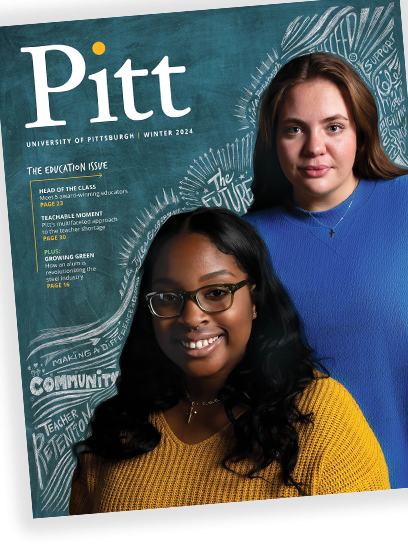
It’s been a quiet Wednesday at Astro Beer Hall in Washington, D.C. But at 7 p.m., a crowd filters into the bar, and eager karaoke-goers fill vacant seats.
The timing is no coincidence: It’s thanks to The Regular, an app that connects leagues, meetups and other groups with venues that have idle hours. It boosts revenue for businesses while helping users avoid loneliness—a feeling the company’s founder, Brandolon Barnett, knows well.
More than 15 years ago, he was an idealistic communications major at the University of Pittsburgh at Bradford, eager to build a career in helping others. But Barnett (UPB ’07) graduated with debt just as the Great Recession kicked off.
 Still determined to make a difference, he worked for several nonprofits and non-governmental organizations before earning a graduate degree from SOAS University of London. Eventually, he accepted an internship at a nonprofit and moved alone to the San Francisco Bay Area.
Still determined to make a difference, he worked for several nonprofits and non-governmental organizations before earning a graduate degree from SOAS University of London. Eventually, he accepted an internship at a nonprofit and moved alone to the San Francisco Bay Area.
On his intern salary, Barnett helped his mother pay her bills, even as he struggled to afford housing, food and student loan payments. One night, unable to afford a train ticket home and contemplating spending the night on the San Francisco streets, Barnett wondered why it’s often so hard to find a well-paying job that also makes a positive difference in the world.
This question ultimately inspired his memoir, “Dreams Deferred,” which details his journey through poverty as a Black man and how, through his dedication to altruism, he found a fulfilling and successful career.
Over the last decade, as a professional working at the intersection of technology and social impact, he’s led corporate social responsibility and product teams for companies like Salesforce and Giving Compass and built donation platforms that have received billions of dollars.
He’s also created his own project, Democratize Ventures, through which he invests in small-business owners who share his passion and vision for a better world. It's through this company that Barnett has pursued his own ventures, including The Regular.
Barnett hopes his book inspires readers and reminds them that, even at their loneliest, support is never too far away.
“I always thought that I was going through all of those things alone,” Barnett says. “Looking back, there were so many mentors. I had people who believed in me, family members who would have helped me to overcome some of the obstacles that I faced if I'd been willing to share and ask for help.”
More recommended reading by Pitt alumni
 Ill-Gotten Gold: A Mostly-True Confession Story (Self-published)
Ill-Gotten Gold: A Mostly-True Confession Story (Self-published)
Sitting before a campfire, a storyteller divulges the fantastical details of the time she and her Pitt roommates stumbled upon a group of armored men on horses in search of gold in Schenley Park. The story is one in a series of “Mostly-True Short Stories” from Megan Schreiber-Carter (A&S ’85), a third-generation native of the Allegheny Mountains who calls on the region’s folktale heritage through her writing. “Ill-Gotten Gold” takes readers along on a medieval treasure hunt in modern-day Pittsburgh to explore chivalry, dishonesty, thievery and the hazards of acting on youthful impulse. — Ashanti McLaurin
 The Power of Change: A Guide to Self-Transformation for Incarcerated Men and Women (Outskirts Press)
The Power of Change: A Guide to Self-Transformation for Incarcerated Men and Women (Outskirts Press)
Patrick Middleton (CGS ’83, EDUC ’84G, ’90G) spent time in and out of juvenile institutions as a young man, each time dismissing his indiscretions as no big deal. That lack of awareness began a spiral that led him to robbery, second-degree homicide and lifetime incarceration. While imprisoned, Middleton has changed his life, earning a PhD from Pitt’s School of Education and authoring six books, including this one. He hopes by recounting his mistakes others will learn practical ways of ending inner conflict and choosing a path of purpose and integrity. — Madeline Gallardo
 On My Way Home: A Memoir of Kinship, Grace, and Hope (A Second Chance Inc.)
On My Way Home: A Memoir of Kinship, Grace, and Hope (A Second Chance Inc.)
Sharon McDaniel (GSPIA ’91G) was 6 years old when she was removed from her father’s care and forced into the child welfare system. She spent the next 11 years wondering where her forever home would be. The disconnect taught her the value of linking children with supportive kin and cultural systems. As she began a career in nonprofits, she established a child welfare agency dedicated to kinship care services. In this book, she shares how her early life motivated her to push for the practice of keeping children safe with families—a practice that’s become an emerging national standard of care. — MG



